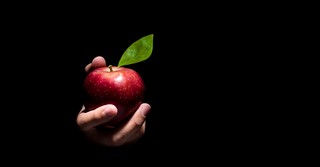Change Translation
- Recent Translations
- All Translations
Genesis 3:6 Meaning and Commentary
And when the woman saw that the tree was good for food,
&c.] She being near the tree, and perhaps just at it when the serpent first attacked her; wherefore looking more wishfully at it, she could discern nothing in the fruit of the tree which showed it to be bad, and unfit to be eaten, or why it should be forbidden for food; but, on the contrary, had a most promising aspect to be very delicious, nourishing and salutary, as any other fruit in the garden: and that it was pleasant to the eyes;
of a beautiful colour, and very inviting to the taste: and a tree to be desired to make one wise;
which above all was the most engaging, and was the most prevailing motive to influence her to eat of it, an eager desire of more wisdom and knowledge; though there was nothing she could see in the tree, and the fruit of it, which promised this; only she perceived in her mind, by the discourse she had with the serpent, and by what he had told her, and she believed, that this would be the consequence of eating this fruit, which was very desirable, and she concluded within herself that so it would be: she took of the fruit thereof, and did eat;
she took it off of the tree, and not only tasted of it, but ate of it; what quantity cannot be said, enough to break the divine law, and to incur the divine displeasure: so Sanchoniatho says F12, that Aeon (the same with Eve) found the way of taking food from trees: and gave also to her husband with her;
that he might eat as well as she, and partake of the same benefits and advantages she hoped to reap from hence; for no doubt it was of good will, and not ill will, that she gave it to him; and when she offered it to him, it is highly probable she made use of arguments with him, and pressed him hard to it, telling him what delicious food it was, as well as how useful it would be to him and her. The Jews infer from hence, that Adam was with her all the while, and heard the discourse between the serpent and her, yet did not interpose nor dissuade his wife from eating the fruit, and being prevailed upon by the arguments used; or however through a strong affection for his wife, that she might not die alone, he did as she had done: and he did eat;
on which an emphasis may be observed, for it was upon his eating the fate of his posterity depended; for not the woman but the man was the federal head, and he sinning, all his posterity sinned in him, and died in him; through this offence judgment came upon all to condemnation; all became sinners, and obnoxious to death, ( Romans 5:12-19 ) . If Eve only had eaten of the forbidden fruit, it could only have personally affected herself, and she only would have died; and had this been the case, God would have formed another woman for Adam, for the propagation of mankind, had he stood; though since he fell as well as she, it is needless to inquire, and may seem too bold to say what otherwise would have been the case.
F12 Apud Euseb. Praepar. Evangel. l. 1. p. 34.
Genesis 3:6 In-Context
Study Tools
PLUSUnlock Notes
This feature is for PLUS subscribers only. Join PLUS today to access these tools and more.
JOIN PLUSUnlock Highlights
This feature is for PLUS subscribers only. Join PLUS today to access these tools and more.
JOIN PLUSUnlock Bookmarks
This feature is for PLUS subscribers only. Join PLUS today to access these tools and more.
JOIN PLUSTrack Your Reading
Create a free account to start a reading plan, or join PLUS to unlock our full suite of premium study tools.
